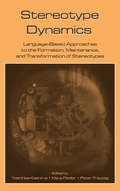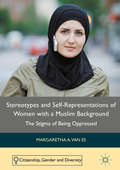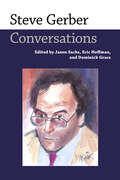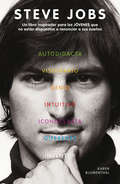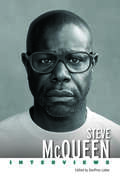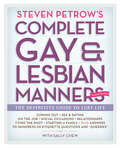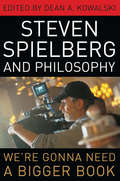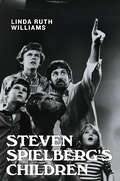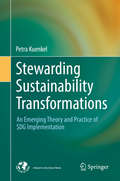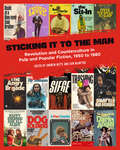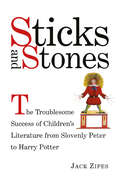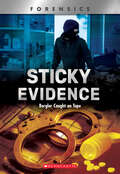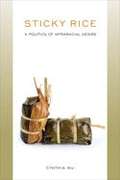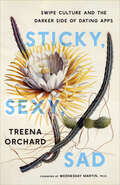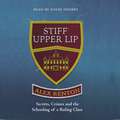- Table View
- List View
Sterbehilfepolitik in Deutschland: Eine Einführung (essentials)
by Caroline PreidelCaroline Preidel befasst sich mit der Sterbehilfepolitik in Deutschland - sie gibt damit eine Einführung in ein Feld der deutschen Moralpolitik. Die Autorin definiert, welche Formen der Sterbehilfe es gibt, und beleuchtet die Konfliktdimensionen des Politikfelds. Anschließend erörtert sie, wie Deutschland und die anderen Länder Europas mit diesem moralisch aufgeladenen und komplexen Thema umgehen. Zudem wirft die Autorin einen detaillierten Blick auf die deutsche Regulierungsgeschichte und analysiert die Ursachen für die Reformbehäbigkeit Deutschlands in der Sterbehilfepolitik.
Sterbende Menschen sprechen mit jungen Menschen: Eine Videoanalyse (Palliative Care und Forschung)
by Martin W. Schnell Christine Dunger Christian Schulz-QuachDie vorliegende Untersuchung zeigt, welche Sicht sterbende Menschen auf ihre Situation und auf die Welt anlässlich eines Gesprächs mit einem jungen Menschen haben und äußern. Die Gespräche sind als Video verfügbar und wurden durch eine Videoanalyse ausgewertet. Die Methode der Videoanalyse wird zudem vorgestellt und ausführlich reflektiert.
Stereotype Dynamics: Language-Based Approaches to the Formation, Maintenance, and Transformation of Stereotypes
by Klaus Fiedler Yoshihisa Kashima Peter FreytagThis volume addresses the role of communication in stereotype dynamics, while placing the phenomenon of social stereotypes appropriately in the socio-cultural context. Stereotype Dynamics assembles top researchers in the field to investigate stereotype formation, maintenance, and transformation through interpersonal facets of communication.Section
Stereotypes and Self-Representations of Women with a Muslim Background: The Stigma of Being Oppressed (Citizenship, Gender and Diversity)
by Margaretha A. van EsThis book explores how stereotypes of “oppressed Muslim women” feed into the self-representations of women with a Muslim background. The focus is on women active in, and speaking on behalf of, a wide variety of minority self-organisations in the Netherlands and Norway between 1975 and 2010. The author reveals how these women have internalised and appropriated particular stereotypes, and also developed counter-stereotypes about majority Dutch or Norwegian women. She demonstrates, above all, how they have tried time and again to change popular perceptions by providing alternative images of themselves and of Islam, paying particular attention to their attempts to gain access to media debates. Her central argument is that their efforts to undermine stereotypes can be understood as an assertion of belonging in Dutch and Norwegian society and, in the case of women committed to Islam, as a demand for their religion to be accepted. This innovative work provides a “history from below” that makes a valuable contribution to scholarly debates about citizenship as a practice of inclusion and exclusion. Providing new insights into the dynamics between stereotyping and self-representation, it will appeal to scholars of gender, religion, media, and cultural diversity.
Steuerstrafrecht (Springer-Lehrbuch)
by Dennis Bock Friedrich Sebastian FülscherDieses Buch enthält – insbesondere für Studierende, aber auch Berufseinsteiger – eine Einführung in das Steuerstrafrecht sowohl in materieller als auch verfahrensrechtlicher Hinsicht. Die Autoren aus Wissenschaft und Praxis verbinden ihre Erfahrungen zu einem mit zahlreichen Beispielsfällen (vornehmlich aus der aktuellen Rechtsprechung) versehenen Lehrwerk, welches sich zum Ziel setzt, eine auf den ersten Blick nicht leicht zugängliche Materie einprägsam darzustellen.
Steuerung der betrieblichen Altersversorgung in Europa: garantierte Sicherheit?
by Sylvie Hennion Otto KaufmannNahezu alle europäischen Staaten haben ihre Alterssicherungssysteme reformiert mit dem Ziel, sie zu konsolidieren. Die betriebliche Altersversorgung ist seitdem zu einem Schwerpunkt betrieblicher Sozialpolitik geworden. Bei der Errichtung, Durchführung und der Kontrolle betrieblicher Altersversorgungssysteme stellen sich zahlreiche Rechtsfragen. In dem Werk wird das Zusammenwirken der Sozialpartner analysiert. Es wird aufgezeigt, welche Handlungsspielräume bestehen und welche Kontroll- und Entscheidungskompetenzen jeweils eingeräumt werden.
Steuerung und Erfolgskontrolle im Strafvollzug: Zur evidenzbasierten Gestaltung freiheitsentziehender Sanktionen (Edition Forschung und Entwicklung in der Strafrechtspflege)
by Wolfgang WirthDer Strafvollzug soll Inhaftierte zu einem straffreien Leben befähigen. Dabei gilt die Vermeidung des Rückfalls als zentraler Maßstab zur Beurteilung des Erfolgs oder Scheiterns freiheitsentziehender Sanktionen. Im Zentrum des Buches steht die Frage, ob und wie individuelle Rückfallrisiken der Gefangenen verringert, ihre sozialen Eingliederungschancen gesteigert und die angestrebten Wirkungen auf die Legalbewährung erreicht werden können. Zentrale Forschungsbefunde sowie die Möglichkeiten und Grenzen einer darauf beruhenden, evidenzbasierten Vollzugsgestaltung werden beschrieben. Abschließend werden Probleme und Perspektiven praxisorientierter Forschung im und über den Strafvollzug skizziert.
Steve Gerber: Conversations (Conversations with Comic Artists Series)
by Jason Sacks, Eric Hoffman and Dominick GraceSteve Gerber (1947–2008) is among the most significant comics writers of the modern era. Best known for his magnum opus Howard the Duck, he also wrote influential series such as Man-Thing, Omega the Unknown, The Phantom Zone, and Hard Time, expressing a combination of intelligence and empathy rare in American comics. Gerber rose to prominence during the 1970s. His work for Marvel Comics during that era helped revitalize several increasingly clichéd generic conventions of superhero, horror, and funny animal comics by inserting satire, psychological complexity, and existential absurdism. Gerber's scripts were also often socially conscious, confronting, among other things, capitalism, environmentalism, political corruption, and censorship. His critique also extended into the personal sphere, addressing such taboo topics as domestic violence, racism, inequality, and poverty. This volume follows Gerber’s career through a range of interviews, beginning with his height during the 1970s and ending with an interview with Michael Eury just before Gerber’s death in 2008. Among the pieces featured is a 1976 interview with Mark Lerer, originally published in the low-circulation fanzine Pittsburgh Fan Forum, where Gerber looks back on his work for Marvel during the early to mid-1970s, his most prolific period. This volume concludes with selections from Gerber’s dialogue with his readers and admirers in online forums and a Gerber-based Yahoo Group, wherein he candidly discusses his many projects over the years. Gerber’s unique voice in comics has established his legacy. Indeed, his contribution earned him a posthumous induction into the Will Eisner Comic Book Hall of Fame.
Steve Jobs: Un libro inspirador para los JÓVENES que no están dispuestos a renunciar a sus sueños
by Karen BlumenthalAutodidacta, visionario, genio, intuitivo, iconoclassta, diferente, inventor. Steve Jobs, el hombre que pensaba diferente. Un libro inspirador para los JÓVENES que no están dispuestos a renunciar a sus sueños. Más que aparatos electrónicos, lo que Jobs dejó a los jóvenes fueron importantes lecciones de vida: un modelo de coraje, de iniciativa y de creatividad. Ésta es su historia, escrita de la manera que a ti te gustaría que te la contaran. La trayectoria de este genio, icono del siglo XXI, fue impredecible desde el inicio. Al nacer, fue dado en adopción, abandonó la carrera tras el primer semestre en la universidad... Sin embargo, con tan solo veinte años, creó Apple en el garaje de su casa junto con su amigo Steve Wozniack. Y así surgió su marca personal: una rigurosa búsqueda de perfección, un modo alternativo de acercarse a los problemas y un estilo que le llevó más allá de todo límite. Steve Jobs no solo te interesará por sus ordenadores, iPads e iPods, sino por cómo era y cómo vivió su vida: un visionario con un complicado carácter que resultó ser todo un ejemplo de lo que se puede conseguir si uno persigue sus sueños y permanece fiel a sí mismo. «No dejéis que el ruido de las opiniones de los demás ahogue vuestra propia voz interior. Tened el coraje de seguir vuestro corazón y vuestra intuición. De algún modo, ellos ya saben lo que realmente quieres ser. Vuestro tiempo es finito, no lo malgastéis viviendo la vida de otro»Steve Jobs Reseñas: [...] La biografía de Blumenthal, una mirada en profundidad a la vida de este visionario, se convierte en la favorita de cara al público más joven. Blumenthal, antigua periodista de economía, utiliza un discurso que dio Steve Jobs ante una promoción de estudiantes de Stanford como la puerta de entrada hacia la que atrae al lector. Steve Jobs contó al público una serie de historias sobre los incidentes más importantes de su vida. [...] Su última historia trataba del cáncer, y su mensaje fue: «seguid los dictados de vuestro corazón y vuestra intuición». Por medio de una serie de entrevistas originales, un uso inteligente de las fuentes y un estilo maravillosamente fluido, Blumenthal ofrece un completo retrato de Jobs con sus bien documentados defectos, su estética tan original y clarividente, y su disposición a presionarse a sí mismo y a los demás con el objetivo de lograr lo mejor según su percepción. [...] La exposición que se hace sobre la relación entre Apple y la compañía discográfica de los Beatles, Apple Corps., resulta entretenida e instructiva. Un libro inteligente de una autora inteligente sobre un individuo inteligente. Ilustrado con fotografías. Adjunta un glosario y sus fuentes. Ilene Cooper, Booklist
Steve McQueen: Interviews (Conversations with Filmmakers Series)
by Geoffrey LokkeSteve McQueen: Interviews is the first collection of conversations with the acclaimed filmmaker, and one that spans his career to date. Included are McQueen’s discussions with such artists, critics, curators, and public intellectuals as Donna De Salvo, Paul Gilroy, David Olusoga, Tricky, and Cornel West. In these conversations, McQueen (b. 1969) discusses some of his preoccupations and recurring themes throughout his oeuvre including nationalism, martyrdom, and violence; obsession and desire; and the intertwined histories of racism, surveillance, and carceral politics. Most interestingly, he also talks about his love for his fellow artists, past and present, including Miles Davis, Jean-Luc Godard, Prince, Yvonne Rainer, Paul Robeson, Jean Vigo, and Andy Warhol.McQueen is one of the most celebrated British filmmakers of his generation, an artist as committed to avant-garde film and lyric forms of documentary as he is to producing landmark historical dramas. A deeply humane artist with a clear ethical drive, McQueen nevertheless explores the sublime sense of scale that cinema affords its viewers in his films. While he remains best known for his feature film 12 Years a Slave—winner of three Academy Awards including Best Picture—McQueen has been a fixture of major contemporary museum and gallery exhibitions for decades, beginning with the short experimental works that garnered him the prestigious Turner Prize in 1999. His acclaimed installations include the diptychs Caribs’ Leap/Western Deep and Gravesend/Unexploded, works that interrogate film form as they challenge documentary norms, not unlike his recent four-and-a-half-hour epic Occupied City that investigates the Nazi occupation of Amsterdam.
Steven Petrow's Complete Gay & Lesbian Manners: The Definitive Guide to LGBT Life
by Steven Petrow Sally Chew**In recognition of Quality, Excellence, and Design, this ebook has been granted a QED seal of approval from Digital Book World.**Finally, the first big book of manners for the more than 15 million lesbian, gay, bisexual, and transgender people in the United States and Canada and the people who love them, work with them, and live with them. Written by Steven Petrow, the go-to authority on the subject—he’s the same-sex wedding expert at The New York Times and a columnist for The Huffington Post, Yahoo’s Shine, GayWeddings.com, and the “Q” Syndicate (with distribution to more than 100 LGBT newspapers and websites)—this is the definitive book of LGBT etiquette. Encyclopedic in its approach, filled with practical wisdom, lively wit, and much insight, Steven Petrow’s Complete Gay & Lesbian Manners covers everything: from coming out to being out in the workplace; from dealing with the joy and complexity of same-sex weddings and commitment ceremonies (including how to propose and write meaningful vows) to handling the legal paperwork every couple needs. There’s a chapter on sex etiquette, and another on the challenges and opportunities of raising a family, plus sections on travel, bullying, entertaining, meeting new friends, introducing your partner to your family, a primer on gay pride, and so much more. Throughout there are hundreds of questions—some posed by LGBT folk, and others by straight people: What do the mothers of two brides wear to a lesbian wedding? What do you say to an anti-gay joke? How do you answer “Who’s the father?” when there are two mothers?Manners, yes, but with a twist.
Steven Spielberg and Philosophy: We're Gonna Need a Bigger Book (The Philosophy of Popular Culture #Ppcs)
by Dean A. Kowalski&“This lively collection of essays on the ideas underpinning his films enriches and enlarges our understanding of Spielberg&’s complex body of work.&” —Joseph McBride, author of Steven Spielberg: A Biography Few directors have had as powerful an influence on the film industry and the movie-going public as Steven Spielberg. Whatever the subject—dinosaurs, war, extra-terrestrials, slavery, the Holocaust, or terrorism—one clear and consistent touchstone is present in all of Spielberg&’s films: an interest in the human condition. In movies ranging from Jaws to Schindler&’s List to Amistad to Jurassic Park, he has brought to life some of the most popular heroes—and most despised villains—of all time. In Steven Spielberg and Philosophy, Dean A. Kowalski and some of the nation&’s most respected philosophers investigate Spielberg&’s art to illuminate the nature of humanity. The book explores rich themes such as cinematic realism, fictional belief, terrorism, family ethics, consciousness, virtue and moral character, human rights, and religion in Spielberg&’s work. Avid moviegoers and deep thinkers will discover plenty to enjoy in this collection.
Steven Spielberg's Children
by Linda Ruth WilliamsWhy has Steven Spielberg’s work been so often identified with childhood and children? How does the director elicit such complex performances from his young actors? Steven Spielberg’s Children is the first book to investigate children, childhood, and Spielberg’s employment of child actors together and in depth. Through a series of lively readings of both the celebrated performances he elicits from his young stars in films such as E.T.: The Extra Terrestrial, A.I.: Artificial Intelligence, and Empire of the Sun, as well as less discussed roles in films such as War of the Worlds, The BFG, and Jurassic Park, this book shows children to be key players in the director’s articulation of childhood since the 1970s. Steven Spielberg’s Children presents children and childhood in some surprising ways, not only analyzing boyhood and girlhood according to Spielberg, but considering children as alien, adult-children who refuse to grow up, and children who aren’t even human. It discusses the way in which children have served to cast Spielberg as a sentimentalist, but also how they are more frequently framed as complex, cruel, and canny. The child might be dangled as bait in an exploitation horror scenario (Jaws), might become the image of universal higher beings (Close Encounters of the Third Kind), or might be a young cultural creator like the director was himself (The Fabelmans), "born with a camera glued to [his] eye." The child, on both sides of the camera, is a resonant image, signifying all that adult culture wants it to be, yet resisting this through authorship of their own stories. The book also looks at Spielberg's young actors in the long history of child stars in theater and cinema, and how Spielberg’s children have fared as performers and celebrities.
Stewarding Sustainability Transformations: An Emerging Theory and Practice of SDG Implementation
by Petra KuenkelIn the context of the world’s pressing sustainability challenges this new Report to the Club of Rome presents a novel approach to navigating collaborative change in partnerships between governments, research institutions, corporations and civil society activists. With reference to the 17 Sustainable Development Goals and the Planetary Boundaries it introduces the theory and practice of Collective Stewardship as a management tool that respects the integrity of human and natural systems. Drawing on the work of transdisciplinary scientific scholars and seasoned sustainability practitioners, it shows how transformative change can be built on life’s inherent tendency to generate patterns of vitality and resilience. This ground-breaking monograph shows workable pathways to stewarding patterns of aliveness in social and ecological systems at all levels of the global society. As a highly regarded author and expert in collective leadership, Petra Kuenkel inspires academics and practitioners alike to explore new routes towards co-creating responsible futures in the era of the Anthropocene, where the human footprint has begun to change the course of planetary evolution. She invites decision-makers, researchers, planners and social activists to become stewards of systems patterns, enhance their collaborative competencies and guide life-enhancing socio-ecological interaction at scale. The conceptual architecture the author elaborates builds transformation literacy and boils down to a practical guidance for planning and implementing interventions across all sectors of society. It helps bring about change through a deliberate combination of enlivening narratives, empowering metrics, enabling processes, multi-level governance, guiding regulations, and life-supporting innovation. This comprehensive book sets a new direction in the field of sustainability transformations and will become a foundation for planning collective action and achieving impact at scale.
Stewards of Eden: What Scripture Says About the Environment and Why It Matters
by Sandra L. RichterSandra L. Richter cares about the Bible. She also cares about creation.
Stewardship and the Future of the Planet: Promise and Paradox (Routledge Advances in the History of Bioethics)
by Rachel Carnell Chris MounseyThis volume examines historical views of stewardship that have sometimes allowed humans to ravage the earth as well as contemporary and futuristic visions of stewardship that will be necessary to achieve pragmatic progress to save life on earth as we know it. The idea of stewardship – human responsibility to tend the Earth – has been central to human cultures throughout history, as evident in the Judeo-Christian Genesis story of the Garden of Eden and in a diverse range of parallel tales from other traditions around the world. Despite such foundational hortatory stories about preserving the earth on which we live, humanity in the Anthropocene is nevertheless currently destroying the planet with breathtaking speed. Much research on stewardship today – in the disciplines of geography, urban studies, oceans research, and green business practice – offers insights that should help address the ecological challenges facing the planet. Simultaneous scholarship in the humanities and other fields reminds us that the damage done to the planet has often been carried out in the name of tending the land. In order to make progress in environmental stewardship, scholars must speak to each other across the disciplinary boundaries, as they do in this volume.
Stick Together and Come Back Home: Racial Sorting and the Spillover of Carceral Identity
by Patrick Lopez-AguadoIn Stick Together and Come Back Home, Patrick Lopez-Aguado examines how what happens inside a prison affects what happens outside of it. Following the experiences of seventy youth and adults as they navigate juvenile justice and penal facilities before finally going back home, he outlines how institutional authorities structure a “carceral social order” that racially and geographically divides criminalized populations into gang-associated affiliations. These affiliations come to shape one’s exposure to both violence and criminal labeling, and as they spill over the institutional walls they establish how these unfold in high-incarceration neighborhoods as well, revealing the insidious set of consequences that mass incarceration holds for poor communities of color.
Stickhandling through the Margins
by Michael A. RobidouxSome of hockey's fiercest and most passionate players and fans can be found among Canada's First Nations populations, including NHL greats Jordin Tootoo, Jonathan Cheechoo, and Gino Odjick. At first glance the importance of hockey to the country's Aboriginal peoples may seem to indicate assimilation into mainstream society, but Michael A. Robidoux reveals that the game is played and understood very differently in this cultural context. Rather than capitulating to the Euro-Canadian construct of sport, First Nations hockey has become an important site for expressing rich local knowledge and culture.With stories and observations gleaned from three years of ethnographic research, Stickhandling through the Margins richly illustrates how hockey is played and experienced by First Nations peoples across Canada, both in isolated reserve communities and at tournaments that bring together participants from across the country. Robidoux's vivid description transports readers into the world of First Nations hockey, revealing it to be a highly social and at times even spiritual activity ripe with hidden layers of meaning that are often surprising to the outside observer.
Sticking It to the Man: Revolution and Counterculture in Pulp and Popular Fiction, 1950 to 1980
by Iain McIntyre Andrew NetteFrom civil rights and Black Power to the New Left and gay liberation, the 1960s and '70s saw a host of movements shake the status quo. The impact of feminism, anticolonial struggles, wildcat industrial strikes, and antiwar agitation were all felt globally. With social strictures and political structures challenged at every level, pulp and popular fiction could hardly remain unaffected. Feminist, gay, lesbian, black, and other previously marginalized authors broke into crime, thrillers, erotica, and other paperback genres previously dominated by conservative, straight, white males. For their part, pulp hacks struck back with bizarre takes on the revolutionary times, creating fiction that echoed the Nixonian backlash and the coming conservatism of Thatcherism and Reaganism.Sticking It to the Man tracks the ways in which the changing politics and culture of the 1950s, '60s, and '70s were reflected in pulp and popular fiction in the United States, the UK, and Australia. Featuring more than three hundred full-color covers, the book includes in-depth author interviews, illustrated biographies, articles, and reviews from more than two dozen popular culture critics and scholars. Among the works explored, celebrated, and analyzed are books by street-level hustlers turned best-selling black writers Iceberg Slim, Nathan Heard, and Donald Goines; crime heavyweights Chester Himes, Ernest Tidyman, and Brian Garfield; Yippies Anita Hoffman and Ed Sanders; best-selling authors such as Alice Walker, Patricia Nell Warren, and Rita Mae Brown; and a myriad of lesser-known novelists ripe for rediscovery.Contributors include: Gary Phillips, Woody Haut, Emory Holmes II, Michael Bronski, David Whish-Wilson, Susie Thomas, Bill Osgerby, Kinohi Nishikawa, Jenny Pausacker, Linda S. Watts, Scott Adlerberg, Maitland McDonagh, Andrew Nette, Danae Bosler, Michael A. Gonzales, Iain McIntyre, Nicolas Tredell, Brian Coffey, Molly Grattan, Brian Greene, Eric Beaumont, Bill Mohr, J. Kingston Pierce, Steve Aldous, David James Foster, and Alley Hector.
Sticklers, Sideburns and Bikinis
by Graeme DonaldDid you know they started 'hearing through the grapevine' during the American Civil War? It was a reference to the telegraph lines used for communicating with the army. These looked like twisted grapevines. And why does the phrase now suggest unreliable information? Because the lines were used by enemy troops to send false battle reports. Similarly, 'deadline' has a rather disturbing and extremely sinister origin. Again originating in the American Civil War it refers to an actual line drawn in the dirt or marked by a fence around prisoners. If the prisoners crossed this line the guards would shoot to kill. And of course, "Cut to the quick," originally meant a sword blow that cut through the armor and into the flesh beneath.Jam-packed with many amazing facts, Stickler's Sideburns and Bikinis is an intriguing and entertaining trip through the words and phrases that originated in the military but are now used by soldier and civilian alike. The sources of many are surprising and their original use is often far removed from how we use the word today. From 'duds' to 'freelancers' and 'morris dancing' to 'snooker' this enthralling book describes the military origins of words that we all use without thought on a daily basis.
Sticks and Stones: The Troublesome Success of Children's Literature from Slovenly Peter to Harry Potter
by Jack ZipesFirst Published in 2002. Routledge is an imprint of Taylor & Francis, an informa company.
Sticky Evidence: Burglar Caught on Tape (XBooks: Forensics)
by D. B. BeresWas it the perfect crime?When Bob Moranes unlocks the door to his pharmacy, he gasps in shock. The store is in ruins, and the cash register is empty. But medicine and money aren't all that's missing; so are the burglar's fingerprints!High-interest topics, real stories, engaging design, and astonishing photos are the building blocks of the XBooks, a new series of books designed to engage and motivate reluctant and enthusiastic readers alike. How can DNA help a convicted person prove their innocence? How did a burglar steal from a store without leaving any fingerprints? Why was the tiny town in Hardin, Missouri, awash with skeletons after a huge flood? With topics based in science, these action-packed books will help students unlock the power and pleasure of reading... and always ask for more!
Sticky Rice: A Politics Of Intraracial Desire (Asian American History And Culture #204)
by Cynthia WuCynthia Wu’s provocative Sticky Rice examines representations of same-sex desires and intraracial intimacies in some of the most widely read pieces of Asian American literature. Analyzing canonical works such as John Okada’s No-No Boy, Monique Truong’s The Book of Salt, H. T. Tsiang’s And China Has Hands, and Lois-Ann Yamanaka’s Blu’s Hanging, as well as Philip Kan Gotanda’s play, Yankee Dawg You Die, Wu considers how male relationships in these texts blur the boundaries among the homosocial, the homoerotic, and the homosexual in ways that lie beyond our concepts of modern gay identity. <p><p> The “sticky rice” of Wu’s title is a term used in gay Asian American culture to describe Asian American men who desire other Asian American men. The bonds between men addressed in Sticky Rice show how the thoughts and actions founded by real-life intraracially desiring Asian-raced men can inform how we read the refusal of multiple normativities in Asian Americanist discourse. Wu lays bare the trope of male same-sex desires that grapple with how Asian America’s internal divides can be resolved in order to resist assimilation.
Sticky, Sexy, Sad: Swipe Culture and the Darker Side of Dating Apps
by Treena OrchardLifelong luddite Treena Orchard was a newly sober woman coming off a much-needed break from relationships, reluctantly taking the digital plunge by downloading a dating app. Instead of the fun, easy experiences advertised on swiping platforms, she discovered endless upkeep, ghosting, fleeting moments of sexual connection, and a steady flow of misogyny. In Sticky, Sexy, Sad, Orchard uses her skills as both an anthropologist who studies sexuality and a sex-positive feminist to explore what it feels like to want love while also resisting the addictive pull of platforms designed to make us swipe-dependent. She asks important questions for those searching for love in the modern era: What are the social and human impacts of using dating apps? How can we maintain our integrity and warm-blooded desire for intimacy while swiping? Can we resist some of the problematic aspects of swipe culture? Is love on dating apps even possible? Revealing how dating apps are powerful social and sexual technologies that are radically transforming sexuality, relationships, and how we think about ourselves, this remarkable book cracks the code of modern romance. Told with humor and vulnerability, Sticky, Sexy, Sad is a riveting and inspiring guide to staying true to ourselves amid the digitization of love in the twenty-first century.
Stiff Upper Lip: Secrets, Crimes and the Schooling of a Ruling Class
by Alex RentonThis is the story of generations of parents, Britain's richest and grandest, who believed that being miserable at school was necessary to make a good and successful citizen. Childish suffering was a price they accepted for the preservation of their class, and their entitlement. The children who were moulded by this misery and abuse went on - as they still do - to run Britain's public institutions and private companies.Confronting the truth of his own schooldays and the crimes he witnessed, Alex Renton has revealed a much bigger story. It is of a profound malaise in the British elite, shown up by tolerance of the abuse of its own children that amounts to collusion. This culture and its traditions, and the hypocrisy, cronyism and conspiracy that underpin them, are key to any explanation of the scandals over sexual abuse, violence and cover-up in child care institutions that are now shocking the nation.As Renton shows, complicity in this is the bleak secret at the heart of today's British elite.Read by David Thorpe.(p) 2017 Orion Publishing Group


